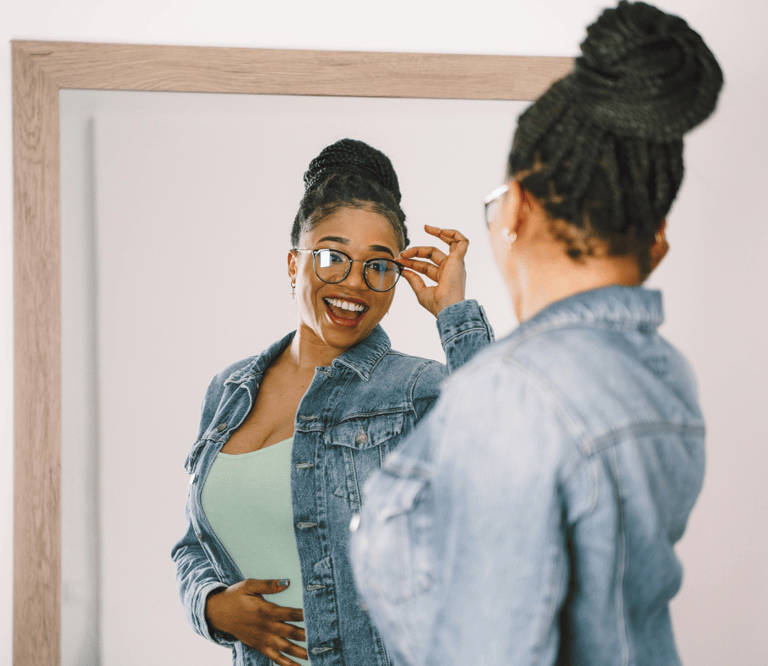Body Image &
Self-Esteem Support Groups
For Women Who Lost Weight But Still Don't Feel Good About Their Bodies
You changed your body for reasons that made sense to you: health, energy, comfort, mobility.
But when you look in the mirror, you still see problems. You still suck in your stomach before pictures. You still feel awful trying on clothes.
Your body changed. Your mind is still catching up.
We're going to help you see yourself the way others see you.
When Changing Your Body Doesn’t Change How You Feel
You made a significant change to your body. Maybe for health reasons, to have more energy, to feel more comfortable, or to be more active with your family. You followed through on what felt necessary at the time.
But you're still:
Constantly checking yourself in mirrors and windows, looking for proof that you look okay
Avoiding parties, beaches, or anywhere you might be in photos because you don't like how you look
Feeling anxious about eating around other people, even though your weight loss journey is long over
Feeling like a fake when people say you look good, like they're seeing something you can't see
Your brain learned certain habits when your body was different, like automatically checking yourself in every mirror or positioning yourself behind other people in photos.
Even though your body has changed, your brain is still doing those same protective behaviors. It's like your mind hasn't gotten the memo that things have changed.
What You've Tried Before
Regular Counseling for Confidence
Most counselors treat body image like it's just low confidence. They help you challenge negative thoughts and build self-worth. That helps some, but it doesn't fix the main issue - your brain still acts like you're in your old body. You can tell yourself you look good, but something inside doesn't believe it.
Body Positivity and Self-Love Approaches
These approaches tell you to accept your body as it is. But that feels weird when you worked so hard to change your body. They don't really get the strange feeling of having a different body but the same old thoughts. You end up feeling guilty for not being grateful enough.
General Support Groups
Most body image groups mix together people with eating disorders, general weight concerns, and confidence issues. Your specific experience - losing weight but still feeling bad - doesn't quite fit. You leave feeling like maybe you're the only one dealing with this.
Self-Help Books and Apps
Books and apps give you exercises and tips, but they can't replace working through this stuff with other people who understand. You read about body acceptance while still avoiding your reflection. The advice sounds good but doesn't seem to stick.
What's really going on: Your brain learned to fight against uncomfortable thoughts and feelings about your body. When you have a negative body thought, you automatically try to push it away, check yourself in mirrors, or adjust your clothes. But fighting these thoughts actually makes them stronger and more frequent.
These other approaches focus on changing how you think about your body or building self-esteem. But trying to control your thoughts and feelings is what keeps you trapped in the cycle. The real solution is learning to have those thoughts and feelings without letting them control your actions.
My Approach: Stop Fighting Your Body Thoughts and Start Living Your Life
I work specifically with women whose minds are caught in constant battles with body thoughts and feelings. Instead of trying to control these experiences, we're going to help you do what matters to you even when body discomfort shows up.
Why Group Work Makes Sense for This
Feeling bad about your body gets worse when you're alone with your thoughts. Those old patterns get stronger when you're by yourself. Group work helps because:
Other people can see what you can't: When other women point out the difference between how you see yourself and how you actually look, it helps your brain start updating its picture of you.
You realize you're not alone: Meeting other women who've lost weight but still struggle helps you see that what you're experiencing is actually pretty normal after big body changes.
You feel calmer: Being around other people who understand what you're going through naturally helps you feel less anxious about your body.
How We Break the Struggle Cycle (Three Steps)
Step 1: Notice the Fight (Weeks 1-3) We help you recognize when you're fighting against body thoughts and feelings instead of just having them. You'll learn to spot the difference between having a negative body thought and getting caught up in trying to make it go away.
Step 2: Choose Your Response (Weeks 4-6)
Through exercises and group discussions, you'll practice having uncomfortable body thoughts and feelings without automatically reacting. Instead of checking mirrors or adjusting clothes, you'll learn to choose actions based on what matters to you.
Step 3: Do What Matters to You (Weeks 7-8) We focus on what you actually want your life to be about - spending time with people you care about, doing activities you enjoy, pursuing goals that have nothing to do with your body. You'll practice doing the things that matter to you even when body discomfort shows up.
Why This Method Gets Better Results
We're working on the right thing: Instead of trying to control your thoughts and feelings about your body, we're changing how you respond to them. This stops the exhausting mental battle.
It's made for your exact situation: This approach is designed specifically for women whose bodies have changed but who are still caught in old patterns of fighting body discomfort. We deal with the unique challenges that come after body changes, like feeling guilty for still having body image issues when people comment positively on your appearance, wondering if people related to you differently before, or feeling disconnected from your changed body.
You're not doing it alone: While we focus on your individual experience, being with other women going through the same thing makes the work much more powerful. You'll see how others handle their body thoughts and feelings differently.
What Changes Look Like
After eight weeks, most women tell me:
You stop fighting your body thoughts: Instead of spending mental energy trying to push away negative thoughts about your appearance, you let them come and go while focusing on other things. You have the thoughts without the thoughts having you.
You make choices based on what you want to do: You decide what to wear, where to go, and what to do based on what you actually want, not based on avoiding body discomfort. You show up to social events because you want to connect with people.
You engage fully in your life: You participate in conversations, activities, and experiences without half your attention on monitoring your body. You're present for your actual life instead of managing your body image.
You feel like yourself inside and outside: Your sense of who you are starts matching how you actually look. That weird disconnected feeling goes away. You recognize yourself.
Eating around people feels normal: You can go to restaurants and eat at work without worrying about what people are thinking. Food becomes about nourishment and enjoyment again.
What it is: 8 weekly 50-minute video calls with up to 10 other women
Cost: $800 (full payment required when you sign up)
Where: Online sessions for women in Connecticut, New Jersey, Washington D.C., Florida, and Delaware
Payment: I don't take insurance - private pay only
This work requires real commitment, both financially and emotionally. The women who get the best results understand that making lasting changes takes focused attention over time.
Who Is This For?
Investment and Details
This approach works best if you:
Made a significant change to your body (whether through surgery, changing how you eat, exercise, or other methods) and maintained that change
Still struggle with how you feel about your body even though you've made changes: maybe you avoid full-length mirrors, wear oversized clothes to hide your shape, or decline invitations because you don't want to be seen
Are ready to invest time and money in intensive work rather than just looking for support or encouragement
Want to do therapy, not just join a support group or take a class
Can attend all 8 sessions and participate actively
Aren't dealing with eating disorder behaviors or other mental health crises right now
Common Questions
How is your approach different from other body image groups? Most groups focus on general self-acceptance or mix together people with different problems. My group is only for women who've made significant body changes but still feel uncomfortable with their bodies. That's a very specific situation that needs a specific approach.
What if I've never done group work before? The way this group is set up makes it comfortable even if you're new to group work. But you should be okay with sharing personal things with a small group of women.
Do I have to talk about my body change details? You share whatever feels important to what you're going through now. We focus on current patterns, not going through your whole body change story.
What if I miss a session? Coming to all sessions is really important to see progress. When you sign up for the group, you’re making a commitment to yourself and to the other group participants that you will attend all 8 sessions.
Do you do individual sessions for this same issue? I do see individual clients, but this particular issue works much better in groups because so much of it involves how you relate to other people. However, if you know you’d like individual therapy instead, please contact me using the form below.


Please complete the form below to be added to the waitlist.
About Me
I’m Grace Annan, a licensed therapist and the founder of Nourisesh. I specialize in helping adults navigate challenges with eating disorders, body image, and self-esteem. Over the years, I’ve guided clients who have felt trapped by diet culture, shame, and negative self-talk toward building healthier, more compassionate relationships with themselves. In leading the Body Image Support Group, my focus is on creating a structured, supportive environment where you can learn practical tools, gain confidence, and connect with others who truly understand what you’re going through.




